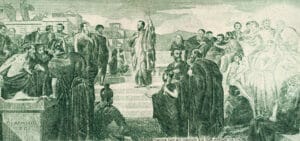After the Charismatic movement of the 1960s, the term apostle has taken the place of bishop or even pastor in many circles. This term is meant to show respect or to denote a minister’s seniority. Some use the term to emphasize that the Holy Spirit operates today as He did in the time of Christ’s disciples. Within Scripture, however, there is a distinction between the roles of bishop, pastor, and apostle.
In 1 Corinthians 12:29-31, the Apostle Paul talks about the gifts of the Spirit. He lists a few offices or church functions are related to the gifts:
“Are all apostles? Are all prophets? Are all teachers? Are all workers of miracles? Do all have gifts of healings? Do all speak with tongues? Do all interpret? But earnestly desire the best gifts. And yet I show you a more excellent way.”
The Apostle Paul’s main point here seems to be that not everyone can operate the same way within the church body. In this passage, the functions of “apostle,” “prophet,” and “teacher” seem to be continuous functions or titles for specific believers within the church. 1 Corinthians 12:31 seems to indicate that someone can ask of God to give them a function considered to be a higher one (one who teaches can pray to operate in an apostolic way, for instance).

What is clear, however, is that the distinct first generation of apostles witnessed Christ and were sent by Christ. In Luke 6:12-16, Jesus chooses the original twelve disciples (who were later commissioned as apostles). In Revelation 21:14, John sees that the foundation of Jerusalem has the name of the twelve apostles (assuming Judas’ exclusion). This demonstrates to us that these original apostles stand out as the original leaders Christ designated for the New Covenant. In this way, they were both governmental leaders and those who operated in an apostolic function.
Meanwhile, the New Testament seems to indicate that there is a more general category of apostle. Many beyond the original twelve are referred to as apostles (Acts 13:2; Romans 16:7; 2 Corinthians 8:23; Philippians 2:25). The question remains then as to what this means. It seems that apostles operate as ultimate servants, caring for the need in leadership and giving correction to the church. Ephesians 2:20 states that the house of God is built on the foundation of the apostles and prophets. Some take this to mean that there are no longer apostles today, but that is not the only way to interpret that statement. It could simply mean that a servant-leader model is always necessary at the head of church leadership. Thus, we may say clearly that Jesus Christ sends those who are apostles as living sacrifices to the church as examples of leadership – a concept that holds no space for arrogance or self-promotion. “Are all apostles?” No, but those who are will likely not seek such a title. Instead, they will live their lives as Paul did, with earnest self-sacrifice for the church.
Want to learn more about early church history? Consider starting with ISOW’s course on What Happened to the Twelve Disciples After The Ascension, or any of our many in-depth online Bible studies. Visit www.ISOW.org today to get started on an affordable online biblical education!
To view courses in Spanish, click here.


